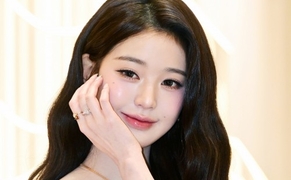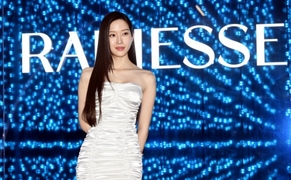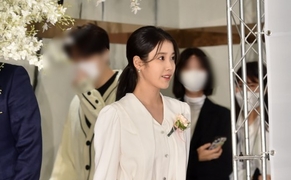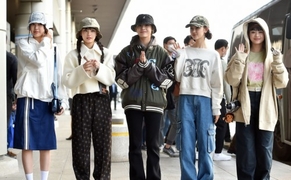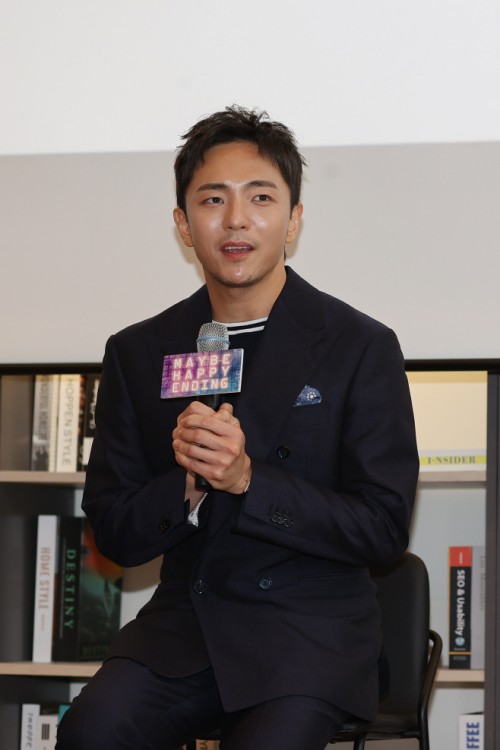 |
| Playwright Park Chun-hyu delivers opening remarks at a press conference celebrating Maybe Happy Ending’s six Tony Awards, held at Community House Masil in Seoul on June 24. / Yonhap News |
“It’s surreal to eat breakfast with a Tony trophy sitting on the table.”
Playwright Park Chun-hyu, co-creator of the Tony Award-winning musical Maybe Happy Ending, shared his reflections at a press conference held in Myeong-dong, Seoul, on June 24, following the show’s sweep of six Tony Awards, including Best Musical.
Expressing his gratitude, Park said, “It feels strange to see such a symbolic trophy sitting in my tiny New York apartment. It’s a reminder that I need to work even harder moving forward as a creator.”
Park also shared the origins of Maybe Happy Ending for the first time. He recounted a deeply personal period in his life, marked by a breakup and the loss of a close friend to cancer. “I thought, ‘If I hadn’t loved them, maybe I wouldn’t be in this much pain,’” he recalled. Inspiration struck when he heard Damon Albarn’s song “Everyday Robots” at a café, which likened human loneliness to that of robots. “It made me wonder—what if a robot experienced loss and sorrow? That’s when I called Will,” he said, referring to his creative partner Will Aronson.
On the show’s success on Broadway, Park credited its distinctly Korean themes and emotional tone. “At first, many said it wouldn’t work on Broadway. Who would come see a musical about robots set in Korea?” he said. “But perhaps that unfamiliarity came across as something fresh, and audiences responded with enthusiasm.” He revealed that even the Korean word hwabun (flower pot) was intentionally kept in the script. “Actors asked how to pronounce it and actually liked it more,” Park said.
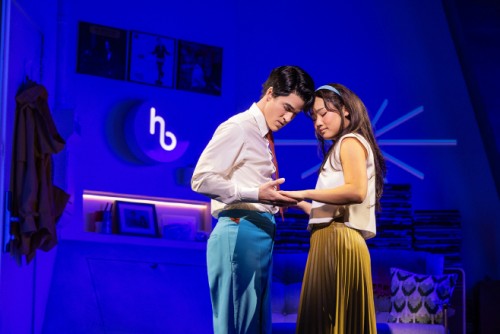 |
| Broadway production of the musical Maybe Happy Ending. / Courtesy of NHN Link |
Maybe Happy Ending began development in 2014 and took a full decade to reach Broadway in 2024. Park likened himself and Will to the show’s character Claire, saying, “We’re the type who try not to expect too much because we’re afraid of heartbreak.” Reflecting on Tony night, he said, “It was like a chaotic marathon. I was happy, overwhelmed, and even unsure if I really deserved it.”
Park also spoke candidly about his struggles as an immigrant. “There were times I thought about giving it all up and returning to Korea,” he said. “But I eventually met good people and found new opportunities. Korean audiences were my true source of strength—they helped me believe in my voice, even in the U.S.”
He observed that Korean and Broadway audiences respond similarly to emotional moments, though Broadway audiences tend to be more vocal. “They cheer and clap physically, while Korean audiences feel things more quietly,” he said.
On the recent buzz around the term “K-musical,” Park commented, “It may not be as globally recognized as K-pop, but if the word ‘Korea’ adds an emotional richness to a musical, then yes, that’s what makes it a K-musical.” He praised Korea’s supportive system for creators but added, “The royalty structure could use improvement so that creators are compensated more fairly.”
The 10th-anniversary run of Maybe Happy Ending will be staged at Doosan Art Center’s YeonGang Hall from October 30 through January 25. Park said, “The script and music won’t change. We’ve been doing this for 10 years, and even after its Broadway success, I don’t feel the need to alter it. I’m excited to bring it back to Korean audiences just as it is, true to our sensibility.”
When asked about pressure from the Tony win, Park admitted, “It’d be a lie to say I don’t feel it. But if I let it weigh me down, I might end up writing something forced.” He added, “Luckily, I have Will, an amazing collaborator, so we’ll keep doing what we’ve always done—supporting each other.”
Park also revealed plans to soon present his other works, Il Tenore and Ghost Bakery, both in Korea and overseas.
Most Read
-
1
-
2
-
3
-
4
-
5
-
6
-
7

















